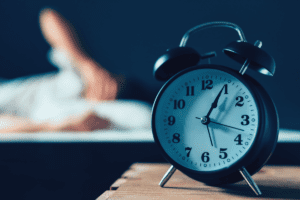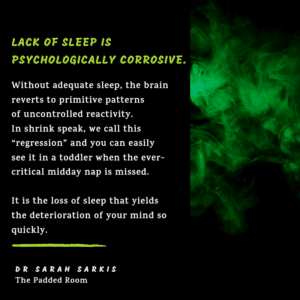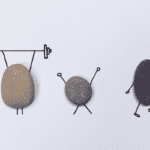What if I told you there is something you can start tonight that will yield psychological benefits tomorrow? Would you do it? If it was a pill, would you take it?
Consider these additional facts about what I am going to suggest in today’s post:
It’s free to everyone, across gender, SES, race, religions, etc.
It does not require a prescription.
It’s available and necessary for all humans.
Loss of this is an early predictor of chronic and catastrophic illnesses, long before physical symptoms will surface.
Adequate amount is unequivocally associated with psychological wellness.
It is critical for learning, memory and performance.
You will die from deprivation of this long before hunger or hydration wears you down.
It is so critical to your longevity that habitual deficits result in increased chances of suicide attempts, ideation, and completion.
It is critical for adolescent emotional development
Sufficient amounts can help prevent dementia
Any guesses on what topic we are going to explore today?
(Virtual drum roll please…)
Sleep.
And funny enough, coming from a shrink, I am not going to mention your dream life even once in this exploration of sleep.
Today I want to deep dive into the role adequate sleep plays in your quest for emotional and psychological wellness. And, as always here in The Padded Room, I want you to observe what your sleep patterns reveal to you about your interior life and unconscious patterns. I ask all of my patients about their sleep habits. With sleep, it’s important to explore regularity, continuity, quantity, and quality. All four components play a critical role in your emotional and physical well-being.

When sleep is chronically disrupted, that is often one the early indicators that something is off in the system – be it because of stress, medication, disease, or something pain-related. My experience clinically is that every single patient that comes in endorsing symptoms consistent with depression and anxiety have massively disrupted sleep patterns, 100% of the time. That almost never happens in the social sciences. But it does with sleep. As sleep erodes, rates of anxiety, depression, suicide, ADHD, learning issues, bipolar disorder, and psychotic disorders skyrocket.
There are over 70 different types of sleep disorders that all cause disruptions in critical sleep patterns. Insomnia continues to rise year after year. It is estimated that over 60 million Americans experience insomnia annually. Most (roughly 75%) will improve with behavioral interventions alone. That’s pretty good odds. Twenty five percent will go on to develop chronic and acute insomnia.
First, Sleep 101
I want you to think of sleep as a cycle or a wave that rolls in and roll out all night. Typical sleep cycles are roughly ninety-minutes throughout the evening in rhythms that are restorative, detoxifying, and critical to our emotional and physical development.
The ninety-minute cycle stays consistent throughout the night, but what does shift is the ratio of non-REM to REM sleep. In the first half of the night, the ratio favors non-REM sleep, our deepest regions of unconsciousness. As you move through the night and closer to consciousness, REM sleep increases and deep sleep diminishes.
It turns out that the brain, body, and mind make good use of these different but equally important ratios of REM to non-REM sleep. During the deepest parts of our non-REM sleep, our brain has a detoxifying system used to clean out the crud from our skulls. It’s called a Glymphatic System and it works just like the Lymphatic system in our bodies. These are the cycles of sleep where the body heals itself, replaces cells, heals wounds, and builds muscle and tissue. If you are woken in the midst of non-REM sleep, you feel groggy and exhausted. This type of sleep is deeply restorative and critical to our overall wellness.
As you move through the night and enter the border town between conscious and unconscious, your REM sleep increases in quantity and your deep sleep recedes. This usually occurs in the last several hours of sleep. Adequate REM sleep is critical for a lot of different brain, mood, and bodily-based functions. Without adequate amounts of REM sleep, you will suffer emotionally and adolescents are particularly vulnerable to the pitfalls of loss of REM sleep, as this is the stage where the brain tends to the emotional development of our vessel. Sleep scientists have referred to REM sleep as “overnight therapy” and this is the reason why: REM sleep helps reset the emotional networks in the brain. Another important part about the increase in REM sleep is that this allows for sleep spindles to occur. Spindles are critical for the learning process, both encoding of what you have learned and preparing the brain for additional learning tasks upon waking.
Without adequate sleep, the brain reverts to primitive patterns of uncontrolled reactivity. In shrink speak, we call this “regression” and you can easily see it in a toddler when the ever-critical midday nap is missed. It is the loss of sleep that yields the deterioration of your mind so quickly. Lack of sleep is psychologically corrosive.

Getting under the hood of your sleep habits
Your sleep habits tell me a lot about your psychology. The process of unraveling your sleep patterns and helping you make better choices is complex and always includes elements of our unconscious rhythms.
It’s interesting to think that for most of us, we spent the early part of our lives napping daily. Any parent out there reading this knows all too well how much you have to guard nap-time like your life depends on it. And yet, somewhere along the journey’s path, napping gets re-branded as lazy, a waste of time, or, worse yet, gluttonous. I’d like you to be conscious of these thoughts if they emerge in your observation of your sleep habits. What if you just napped when you felt tired? What if it really is that simple?
And now that I have you thinking about this, consider the role that busy plays in your life too. We are all so busy all the time. I hear people regularly talking about burning the candle at both ends and giving up sleep in order to achieve it all, as though it is some kind of badge of honor or a reflection of their self-worth. There are famous accounts of presidential figures who routinely bragged that they only needed 4-6 hours of sleep per night; Ronald Reagan is famous for this proclamation. Let me remind you: he died from Alzheimer’s disease.
Understanding your sleep routine and deeply examining what it says about you will also help you better understand your relationship with your habits. As you start to reflect on your sleep hygiene, I want you to observe your relationship with technology and alcohol, both of which disturb and inhibit our sleep. The science is clear. Our devices and our relationship with alcohol impact our body’s ability to maintain adequate sleep patterns. It’s not inconclusive or vague, so if you find that you have a hard time regulating either one or both, I would encourage you to start there, observe that pattern. Be curious about that. If you know it’s bad for you and you continue to do it anyway, there must be some psychological process or need that is driving that impulse/compulsion. Dig into that intersection and start to examine your interior world.

And of course, your sleep patterns reveal to us a lot about your cognitive life and the roll your thoughts play in your brain. People will often report that they have a hard time falling asleep or going back to sleep once they wake because their “mind is racing.” This shows us how your psychological processes impact your sleep. Observe that too.
At this point in my career, I believe that adequate sleep (regularity, continuity, quantity, and quality) along with nutritionally dense food choices and sufficient movement are the three most critical elements to master in your life. If all three of these domains were balanced, the landscape of Psychology would be forever changed and modern Psychopharmacology would be on the brink of extinction. But if I had to choose only one for you to master in the coming months, I’d have you start with sleep. I’d encourage you to view sleep as one part of your overall commitment to “recovery” based behaviors in your quest for wellness.
Sleep is that critical.
If this doesn’t convince you to look at your sleep patterns, I suspect nothing will.
Here are 7 Tips to Help Improve Your Sleep Life
– 1 –
Create at least an 8-hour window for sleep each night. If you have an adolescent in your care, make this non-negotiable. It will improve their emotional development drastically and you will see and feel the shifts quickly.
– 2 –
Do not use technology for one hour prior to bedtime.
– 3 –
Try taking magnesium an hour before bed. Consume no other liquids until morning.
– 4 –
Don’t consume alcohol while you are trying to heal your sleep patterns. If this feels difficult, observe that.
– 5 –
Contemplate trying a yoga nidra before bed. This form of meditation has efficacy in treating insomnia.
– 6 –
If you have significant sleep impairments, consult with a sleep specialist who will help you shift your sleep clock. Shifting your sleep clock and other elements related to repairing your sleep habits are often pernicious and need the guidance of a skilled clinician.
– 7 –
If you observe that your psychology is what is getting in the way of adequate sleep, consider working with a skilled psychologist in order to work through those emotional patterns.





